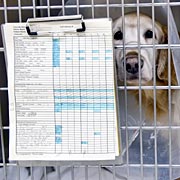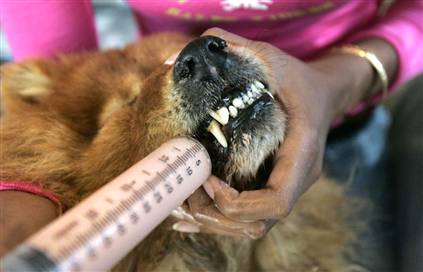 |
Digger Cooper-Vince, a 10-year-old golden retriever, needs an IV at an Ithaca, N.Y., animal hospital after eating tainted food. Matthew Hinton, Ithaca Journal via AP |
WASHINGTON (AP) - Contaminated dog food which was sold in 23 states killed nearly two dozen dogs and sickened 18 more, the Food and Drug Administration said Friday.
 |
Digger Cooper-Vince, a 10-year-old golden retriever, needs an IV at an Ithaca, N.Y., animal hospital after eating tainted food. Matthew Hinton, Ithaca Journal via AP |
The deaths and illnesses sparked an FDA investigation into the pet food made by the Diamond Pet Food Company at its Gaston, S.C., manufacturing plant. The FDA said so far 23 animal deaths have been linked to the pet food.
The company, based in Meta, Mo., issued a recall of 19 varieties of dog and cat food on Dec. 21 because some of the pet food made at the Gaston facility was discovered to contain aflatoxin.
Aflatoxin, a naturally occurring chemical that comes from a fungus sometimes found on corn and other crops, can cause severe liver damage. Aflatoxin poisoning can cause sluggishness, a lack of appetite and in severe cases severe vomiting, fever and jaundice.
The recalled pet food was sold in 23 states under the brand names Diamond, Country Value and Professional, and bears the date codes of March 1, 2007, through June 11, 2007. Consumers are asked to immediately stop using the product.
Last week, Tony Caver, the state veterinarian in South Carolina, said that state has five presumed cases linked to aflatoxin, including three fatalities.
Seven dogs from the Rochester, N.Y., area were being treated at Cornell University Hospital for Animals for liver disease and failure after eating contaminated food, said university spokeswoman Sabina Lee. An area veterinarian discovered the link after three dogs died in the area, she said.
In a Dec. 20 press release, the company said it had notified distributors to hold up the further sale of Diamond pet food that had used corn. The next day it ordered the recall.
"To ensure we got all the affected product or potential to be affected, we cast a very wide net with the recall," Diamond spokesman Jim Fallon said Friday. He said the company is conducting tests and has set up a consumer information center, open seven days a week, to handle consumer questions.
"We are working with customers and their vets to confirm a link between the pet food and the pet's illnesses," he said. "Our whole focus is saving pets' lives and doing the right thing."
The company said it was analyzing retained samples of all of the affected pet food products in Gaston in an attempt to isolate specific lot numbers that were impacted and provide the information to distributors, retailers and customers.
According to the company, the pet food was distributed to stores in Alabama, Connecticut, Delaware, Florida, Georgia, Kentucky, Maine, Maryland, Massachusetts, Mississippi, Michigan, New Hampshire, New Jersey, New York, North Carolina, Ohio, Pennsylvania, Rhode Island, South Carolina, Tennessee, West Virginia, Vermont, and Virginia.
The FDA said some of the recalled product had been exported to at least 29 countries, including several in the European Union. Those countries have been notified, the agency said.
Important Customer Information
12/27/2005
Due to the discovery of aflatoxin, Diamond Pet Foods has issued a voluntary recall of certain pet food products manufactured in our Gaston, S.C. facility and distributed to states in the eastern U.S.
If you suspect your pet has symptoms associated with aflatoxin, please consult your veterinarian immediately.
What products are being recalled?
Recalled products can be identified by the Date Code and "Best By" dates listed on the back panel of the package.
Recalled products will have a capital "G" (in reference to Gaston) in the 11th or 12th position of the date code
(18 lb. to 55 lb. bags), and "Best By" dates between March 1, 2007 and June 10, 2007. The capital "G" will be in the
9th position on smaller 4 lb. to 8 lb. bags.
Diamond's quantitative analysis records substantiate that shipments were definitively clear of aflatoxin after
December 10. As such, "Best By 11-June-07" date codes or later are not affected. Also, products with "Best By"
dates prior to 28-Feb-07 are safe.
Products manufactured at our Gaston S.C. facility included in the recall:
Diamond Premium Adult Dog Food
Diamond Hi-Energy Dog Food
Diamond Maintenance Dog Food
Diamond Performance Dog Food
Diamond Puppy Food
Diamond Low Fat Dog Food
Diamond Maintenance Cat Food
Diamond Professional Cat Food
Country Value Puppy
Country Value Adult Dog Food
Country Value High Energy Dog Food
Country Value Adult Cat Food
Professional Chicken & Rice Adult Dog Food
Professional Puppy Food
Professional Large-Breed Puppy Food
Professional Reduced Fat Cat Food
Professional Adult Cat Food
What states receive products from the Gaston facility?
The Gaston facility provides products to our customers in Alabama, Connecticut, Delaware, Florida, Georgia, Kentucky,
Maine, Maryland, Massachusetts, Michigan*, Mississippi, New Hampshire, New Jersey, New York, North Carolina, Ohio*,
Pennsylvania, Rhode Island, South Carolina, Tennessee*, Vermont, Virginia and West Virginia.
*These states receive product from other Diamond Pet Food facilities. Please check your date code carefully. Unless
it has a capital "G" in the 11th or 12th position of the date code on the larger 15 lb. to 55 lb. bags, it is not
included in the recall. The capital "G" will be in the 9th position on smaller 4 lb. to 8 lb. bags.
Are products manufactured at other Diamond facilities affected by this situation?
No. Products manufactured at our Gaston facility are the only ones subject to the recall.
What clinical signs should I look for from my pet?
Symptoms of potential illness in dogs may be difficult to discern, but include:
Please be aware that many other medical conditions have similar symptoms. Your veterinarian will be able to distinguish between these other conditions and an exposure to aflatoxin based on your pet's medical history and current symptoms. Please consult with your veterinarian if you believe your pet is ill, no matter what the cause. If your veterinarian diagnoses and treats your pet because of exposure to aflatoxin, please have your veterinarian contact Diamond Pet Foods toll free at 1-866-214-6945.
What should I do if my pet consumed recalled products and has any of the clinical signs?
If your pet has consumed products included in the recall and exhibits these systems, please urge your
veterinarian to run a liver profile. If your pet is found to have abnormal liver function, please have any other dog
you may own that was fed the same food tested for liver function as well. Even if your pet does not show symptoms, monitor
it for 7 to 12 days and consult your veterinarian if illness develops.
When should I take my pet to the veterinarian?
If your dog has consumed affected products and has clinical signs of aflatoxin, which include loss of appetite, yellow
whites of the eyes, yellow gums, yellow in the belly or areas where hair is very thin, severe, persistent vomiting combined
with bloody diarrhea, or discolored urine, you should immediately consult your veterinarian.
Because numerous diseases and conditions may have similar clinical signs, your pet could have a problem other than aflatoxin. If your veterinarian institutes treatment for aflatoxin, please have him or her call Diamond Pet Foods toll free at 1-866-214-6945 and ask to speak with one of our consulting veterinarians.
What is Aflatoxin?
Aflatoxin is a naturally occurring toxic chemical by-product from the growth of the fungus Aspergillus flavus, on corn and
other crops. The fungus develops on crops during years with severe high temperature stress and drought.
 |
Shanika Stewart force-feeds strawberry-flavored Ensure through a syringe to her 9 year-old Chow "Cocoa" at her home at Fort Jackson in Columbia, S.C. The dog suffered permanent liver damage after being exposed to aflatoxin in a batch of Diamond pet food. |
MSNBC News Services
Updated: 11:35 a.m. ET Jan. 9, 2006
COLUMBIA, S.C. - The U.S. Food and Drug Administration reports that at least 76 dogs nationwide are believed to have died as a result of eating contaminated Diamond Pet Foods.
The company has recalled 19 varieties of dog and cat food because tests showed high levels of aflatoxin, a naturally occurring toxic chemical that comes from a fungus found on corn and other grains that causes severe liver damage in animals.
The company recalled products manufactured at its Gaston, S.C., plant from around September to November 2005. Based on sample testing, Diamond has narrowed down the exposure to food produced on Oct. 11, Brinkmann said Thursday.
The FDA and the South Carolina Department of Agriculture have launched investigations.
Customers who have purchased the recalled Diamond Pet Food manufactured in the South Carolina plant should immediately stop using it and return any remaining product to their retailer, according to the FDA.
The range of date codes being reviewed are "Best By 01-March-07" through Best By " 11-June-07".
FDA also has discovered that some of the recalled product was exported to at least 29 countries, including countries within the European Union. These countries have been notified.
Diamond officials say they are doing what they can to help affected pet owners.
“It’s going to take some time to take care of all these customers, and we’re going to do it,” said the company’s chief operating officer, Mark Brinkmann.
Diamond has promised to reimburse pet owners for vet bills and other costs associated with the aflatoxin poisoning, which officials now believe may include pets in Europe and other areas outside the country where the food is distributed.
The company set up a call center staffed with veterinarians. The call volume peaked at about 2,000 calls a day last week, Brinkmann said.
Shanika Stewart has been caring for her ailing 9-year-old chow, force-feeding the animal with a syringe six times a day since suffering permanent liver damage after eating contaminated dog food.
“I haven’t had any time to do anything but take care of her,” said Stewart, a 19-year-old nursing student at the University of South Carolina. “She’s the No. 1 priority. ... I get maybe four hours of sleep before she wakes me up.”
Through relocations from Army bases in Georgia, Oklahoma, Washington and now South Carolina, Cocoa has been a constant companion for Stewart, whose father is serving in Iraq.
When her own daughter died last year, Stewart said Cocoa helped her through her grief. “It was like she understood,” Stewart said. “She was my best friend.”
Severe liver damage
Stewart’s other dog, a 2-year-old pit bull named Chulo, died last month just hours after being diagnosed with liver
failure. It was only then that the family learned of the recall.
Stewart initially thought Cocoa had refused to eat because she was depressed about losing Chulo. After the recall, the family vet confirmed aflatoxin poisoning in Cocoa, Stewart said.
Steve Shrum, president of the South Carolina Association of Veterinarians, said vets around the state were confused when puppies began showing signs of liver problems usually seen in older dogs.
“It takes such a small amount, and there’s pretty much nothing you can do with the process that will inactivate that toxin once it gets in the food supply,” he said.
Stewart says she has not spoken with anyone at the company despite several calls. The family has filled out an online form explaining their situation.
“You don’t get anybody to talk to and tell your story,” she said. “It’s like they’re not concerned. To me, it’s like they’re saying, ’Oh well, we’ll get to it when we get to it.”’
Brinkmann was sympathetic.
“We’re going as fast as we can,” he said. “I grieve with her, and I’m going to do everything I can to make sure we can do right by her.”
The Associated Press contributed to this report
Jordemm